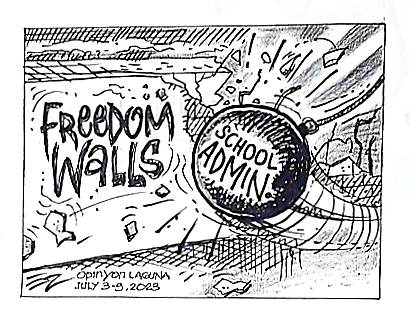In recent years, so-called “Freedom Walls” run by certain students of public and private institutions of learning in social media have come under close scrutiny by school administrations.
These “freedom walls” or pages where students can (anonymously or not) express their views on various issues they face in the duration of their academic life, have been a breath of fresh air for those who believe school officials are still unwilling to handle criticism and would rather keep problems under wraps for fear it would tarnish their schools’ reputation.
Some students charged that that was exactly the reason why some school administrators are now targeting these “freedom walls.”
Last week, two students of a local government-run university in Laguna province claimed they were denied their privilege to graduate due to accusations that they were running a social media page that published criticism on certain university officials.
Although one of the students was later allowed to join the graduation rites and the penalty meted to another student was lowered — from dismissal to suspension — the case has raised a serious issue: freedom of expression in campus.
Let’s face it, the school is a place of learning for students but it is also where critical thinking is enhanced. Hence, the school is also where young minds are free to express themselves, not only through their intelligence and talents but also on caveats and challenges they face.
Unfortunately, as witnessed in numerous cases in the Philippines, complaints by students — particularly those concerning sexual harassment and discrimination — have been treated with passivity or, on extremes, or even reproving student-complainant.
Last year, a sexual abuse case was exposed by students in a prominent state-run art institution in Los Baños, Laguna.
Is ours a culture where impunity is rewarded and speaking out against it is punished, these so-called “freedom walls” have been the last bastion of our students to express their denunciations?
